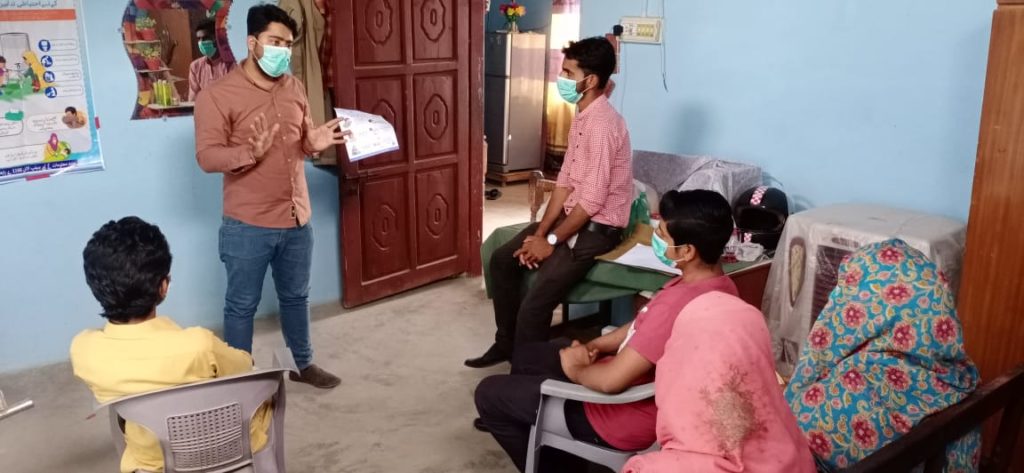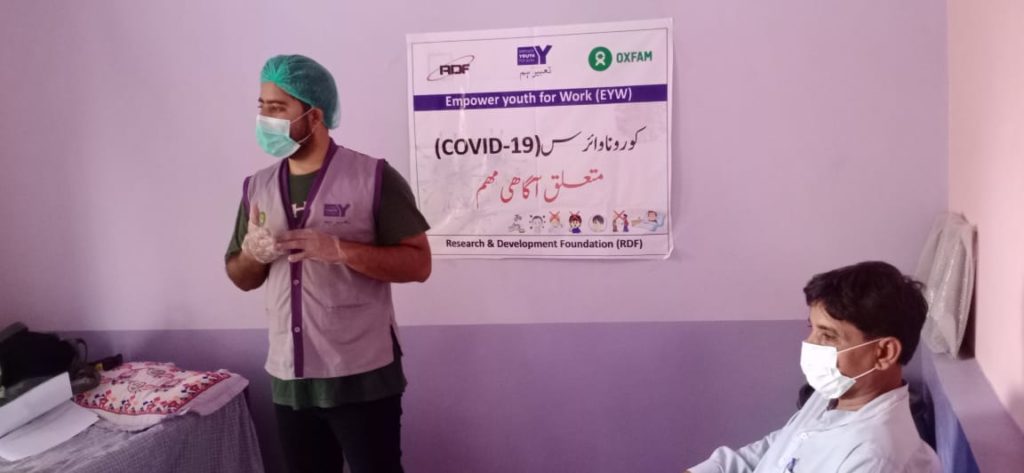I hope this pandemic will change the world order
EYW Youth Leader and Innovator Saif Ali describes his personal experience of the coronavirus crisis, and explains how young people have been rising to the challenge – and giving much more than just their time to help others.
My name is Saif Ali. I recently completed my Master’s in Sociology. I live in Jamshoro in the province of Sindh in Pakistan. I’m working as an Innovator and a Youth leader under the Empower Youth for Work program implemented by the NGO Research and Development Foundation in Jamshoro. Alongside this, I am an entrepreneur, running private hostels in Jamshoro. The city of Jamshoro is known as the city of education, as there are three major universities and many schools and colleges where students come from different cities to study.
A double-edged sword
The ongoing crisis created by Covid-19 has been very challenging for all of us, living in these strange times when everybody is facing a double-edged sword. On one hand, there is the pandemic; on the other hand, there is the economic crisis that has hit us all very badly. But despite these problems, my community and I are strictly following governmental policies that have been made to deal with this situation while we keep ourselves isolated.
Due to the strict lockdown people don’t go outside as often. We perform our prayers inside our homes. We have been maintaining social distancing and I also try my best to raise the awareness of my community on facts related to Covid-19 from reliable sources, because people should be given accurate information so that they can take reasonable precautions.
The biggest challenge we are facing amidst the coronavirus crisis is of course the impact of lockdown. It has created a huge economic crisis, not only for people who are running short of their economic resources, but also because of redundancy – a large number of people have lost their jobs. Many people, like daily waged laborers, have no other way to earn money but to go out and search for work, to even eat one meal.
Unemployment is one of the biggest challenges Pakistan has always faced, and due to the huge bulk of youth being unemployed, half of the country’s population is living under the poverty line. To make matters worse, we are now in danger of 1.5 million more people becoming unemployed due to this global pandemic.

Setting up blood donation camps
During these hard times, the Youth Advisory Board (YAB) arranged a blood donation camp for thalassemia[1] patients, in collaboration with a non-governmental social welfare organization named ‘Jihad for Zero Thalassemia’. The blood camp was arranged at my home, as president of the YAB. I took responsibility for all the expenses that were spent on arranging a blood camp. All the members except two or three donated blood, and we collected almost 25 blood bags for those patients amidst the lockdown. We made safety our top priority – we asked the donors to wear masks, and took all the necessary precautions.
Adapting to changing times
People are now finding new ways to get by in these challenging times. The medium of education is now the internet. People are switching their businesses to the digital space. The number of freelancers is increasing day by day. As in every pandemic the world has faced, people have come up with new ideas to cope with the crisis. The world’s countries are now focusing on their healthcare systems; many have made it their number one priority, which is true not only for governments but for NGOs as well.
People around the world are adapting to lockdowns by swapping physical performance spaces for virtual ones. The events, seminars, training sessions and workshops that we used to arrange in rooms – with participants packed in like sardines – are now replaced with social sites that are connecting people in new ways. Once or twice a week, we arrange training sessions online through Zoom, where all our youth group members participate actively.
We have also collected community data and registered on the government sites so that people in rural areas can be informed of what the government announces for them. Our committee member also helped people from several villages to register for the Ehsaas social safety net program, many of whom were successful in getting governmental funds.
Social distancing comes at a great price for everyone, especially those who live in large families and in small villages. We, through our community leaders, have arranged special seminars to educate them on this buzzword, along with basic precautions they should take.
If we look at the past, then pandemics and various other disasters have given people the chance to think their world anew.
The lockdown has been very beneficial for us as the tally of cases of Covid-19 has not increased, which is surprising for an overpopulated country like Pakistan. (Sadly, this did not remain the case, and Pakistan’s infection rate rose rapidly following the easing of lockdown measures.) But despite this… people are now becoming frustrated as their resources and means of income are depleted. Students are facing problems because of weak internet connections, especially in rural areas. They can’t attend online classes because of poor resources, which is creating a disparity in education because the people living in cities can have these resources easily. Due to Covid-19, many people have become unemployed; people’s way of living has changed substantially.
This too shall pass
If we look at the past, then pandemics and various other disasters have given people the chance to think their world anew, and has let people learn new ways to cope with the situation. It has given people the spirit and strength to fight again. I do hope that this pandemic, which for the most part has been disastrous for us all and has affected people from all walks of life, will somehow change the world order and the way people do things and react. It will give them the sense to use money sensibly instead of spending it on weapons and warfare. I hope that a cure is discovered sooner or later, so we can normalize things and go back to our lives.
The global pandemic has brought the world to its knees, as if all things have come to a halt. The people in my community, though feeling despair and helplessness, have hope that this too shall pass. They believe that it’s a punishment sent to us by God because of our sins as an immoral society, which is standing on the pillars of lies and cheats. But in the midst of this terrible despair, they still hope and believe that they’ll pass this phase and will all soon be back to their routines.

[1] Thalassemia is a blood disorder which is prevalent in Pakistan.
Header image photo credit: Meer Mumtaz Siyal
This story is based on interviews with EYW youth for the Podcast series 'Power in the Pandemic'. Listen to the episode: "Imagine something out of the box" How are young people responding to the pandemic?

